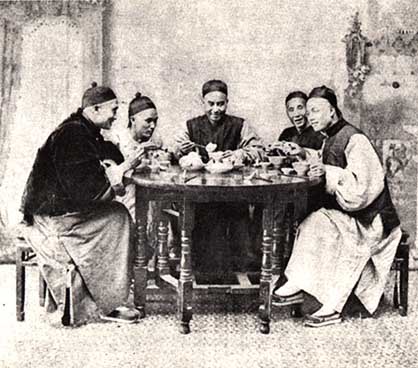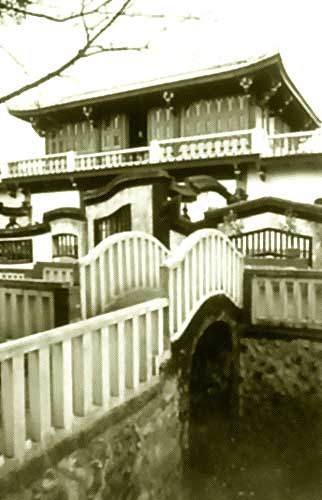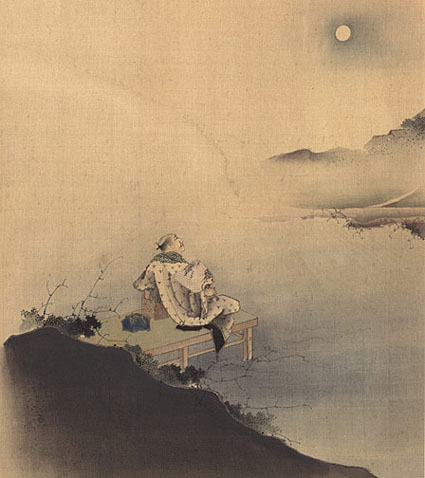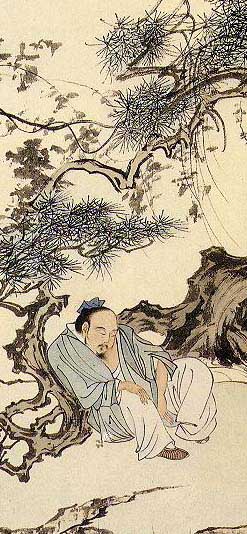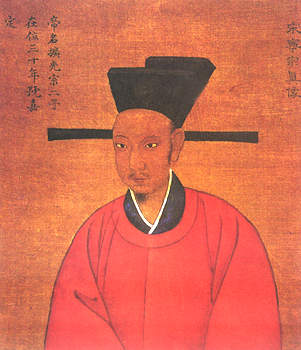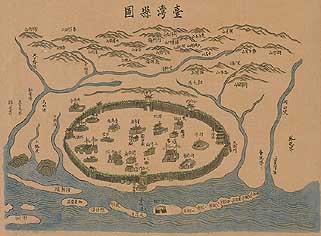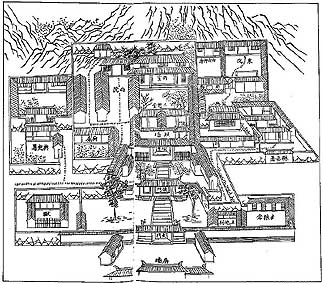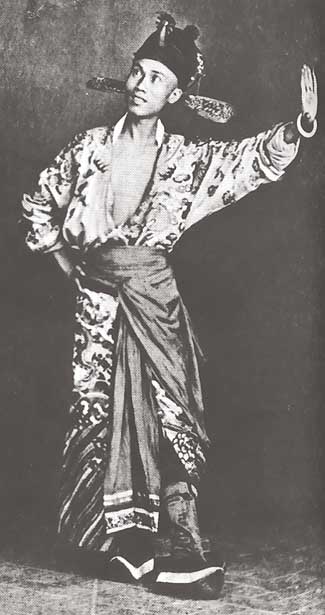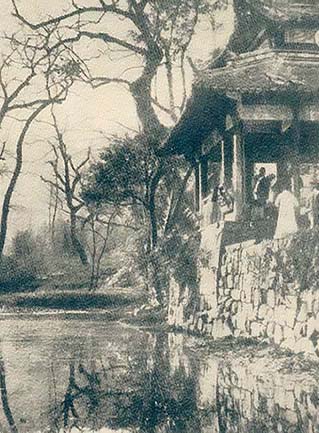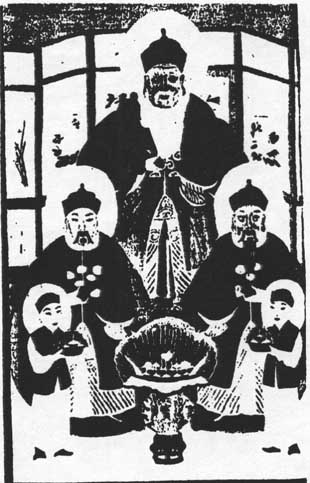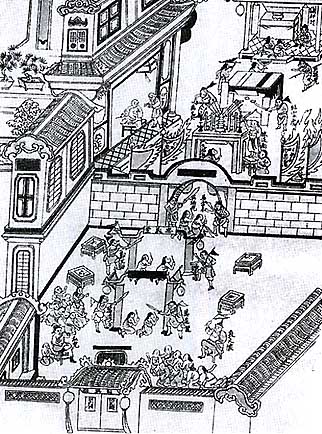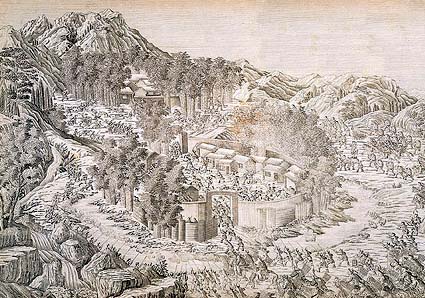|
|||||
|
A Taiwan Fox Tale |
|||||
|
Rania Huntington, a leading researcher into late Ching fox literature, discovered two stories where foxes serve as secretive guardians of an official's seal of office. One of these tales occurred in Taiwan and is reproduced here in translated form. The story of Old Man Wu-cheng was recorded by Wu Chih-chang [吳熾昌], possibly born in 1870, and is contained in the K’e ch’uang hsien hua [客窗閒話] (Leisure Talks at Guest Window) collection published in 1908. It is important in reading the story to note that the name ‘Wu-cheng’ means ‘There is nothing true’, a concept taken from Taoist thought. |
|||||
|
|
|||||
|
Old Man Wu-cheng (無真叟) |
|||||
| There was once a scholar from Zhejiang [浙江, Chekiang] Province, who, after being a secretary in Fujian [福建, Fuchien], was invited to join the staff at a yamen in Taiwan Hsien [臺灣縣]. | |||||
|
When
he came to this Taiwan office, the other members of the yamen staff
shunned him because he was always so taciturn. Since all the comfortable
rooms in the yamen were occupied by these colleagues, there seemed to be
no place for him to dwell.
However the master of the yamen took pity on the aging scholar, and allowed him to use a private, but noisy, chamber. Behind this chamber there was a large garden where the scholar was able to wander and relax. In this garden stood a two-storey building with three rooms: one large chamber above and two smaller rooms below. The two-storey building was surrounded by a low wall, and was always very quiet. It seemed that nobody lived there, for, whenever the scholar rapped upon the door, it always remained tightly closed against the visitor. |
|
||||
|
|
|||||
|
|
The
scholar, whose family name was Chang [章], was about 60 years old and had always studied
Chuang-tzu [莊子]
and
Lao-tzu [老子].
He liked to instruct others on how to empty all desires and worries from
the mind, and thus he himself feared nothing. By now Scholar Chang had become intrigued by the lofted building in the garden and wanted to learn more, so he asked his master for permission to move in. After he had cleaned the two rooms on the lower storey of the building, he installed his servants in one room and occupied the other. Then, wrapping his gown tightly around his body, he ascended the stairs to the second floor to pay his respects to the Fox-Genius. To his surprise, he found the chamber on the upper storey to be scrupulously clean. In the room was a small table upon which was set an inscribed tablet. Upon the tablet were inscribed the words ‘Old Man Wu-cheng’ [無真叟]. Scholar Chang paid his respects before the tablet and spoke as follows; “I, your humble acolyte, am a secretary in this yamen and destiny has led me to dwell in your chambers. I beseech you to accept and protect me as one who also follows the Way (Tao, 道). My sole hope is that you are willing to open my mind and impart in me the wisdom to reach a higher level. I would be humbly grateful if I could feel your merciful kindness.” |
||||
|
With this prayer Scholar Chang retired to his chambers below where he
continued to live quietly, all the time working diligently in the yamen.
Twice a month, on the first day and the fifteenth day, he took
freshly-prepared chicken and warmed wine to lay on the table in the
upper storey as offerings to the Fox-Genius. |
|||||
|
Scholar Chang saw no visible sign of the fox, and yet, when a gentle
breeze stirred the leaves in the garden and the moonlight was very
clear, he fancied that he could hear the sound of footsteps passing
across the floor above and descending the stairs that led to the yard,
and even on occasions that he heard someone gently pushing open the gate
in the low wall that surrounded the building.
These things continued for about half a year until the night of the Mid-Autumn Festival, when the sky was again very clear. On that night Scholar Chang set up a table in the yard and placed upon it wine and chicken, as well as other delicacies. As he sat down at the table to gaze at the moon and partake of his solitary feast, Scholar Chang noticed one winecup suddenly twirl and move to the opposite end of the table all by itself. The winecup then remained there in place. Scholar Chang was exhilarated and, assuming this to be the Fox-Genius, hurried from the yard to dress himself in his finest clothes so that he might pay his deepest respects to the transcendent. Returning to the table, Scholar Chang said, “Oh immortal one, you have surely shown your compassion by coming to share this food with me. Yet how dare I sit here with you?”. With that he raised his cup to make a toast to the Fox-Genius, but there was no response nor even any sound from the other end of the table. |
Scholar Gazing at the Moon Japanese print Hokusai school, 19th century. |
||||
|
The following night, Scholar Chang sent his servants away to another part of the yamen to sleep, and in the building there remained no-one except himself. He fastened the door and entreated the fox-god to come.
At that
very instant, a person appeared on the seat saying, “Scholar Chang, I
have observed you closely for a long time and see that you are a very
true and steadfast man. Before, I have not appeared in physical form in
order not to give any occasion for scandal or gossip to others, but
today I know it is just we two here and we need not worry about any
other person. So tell me, Scholar Chang, what is your true desire?” |
|||||
|
Chuang-tzu (around 300 BC), perhaps the greatest articulator of Taoist thought |
Scholar Chang answered, “I have always longed to find the path for
becoming an immortal, but until this very moment I had never met the one
to help me attain this goal”. [The chronicler here explains the
meaning of this statement: ‘Scholar Chang means that he has studied
the texts of the ancients for so many years, yet still they remain for
him illusory. Now suddenly he is
seeing the god sat in front of him as a reality, and thus he asks the
god to reveal himself to him.’]
The person sitting upon the seat replied thus, “My name is Wu-cheng. Although you think that I am a reality, I am not real but merely something that you wished for and believe to be real.” Scholar Chang retorted, “Then kindly tell me, what is the meaning of your name?” The fox said, “Before our eyes in our houses are many devices, such as everyday objects and our families. These are real. Yet after one hundred years, where will all these devices be? Certainly, people such as your father or son or spouse, these are real, yet when they are dead, where are they?” “Only if you seriously think that these material things are real, do you allow them to be your encumbrance. As for me, I have nothing, so I have no encumbrance and am free, just like the poorest vagabond. Yet people venerate me as a god. I dare not even accept this burden of being a god, so please call me Old Man Wu-cheng (無真叟).” |
||||
| Scholar Chang next enquired, “To which dynastic era do you belong, and through what process did you attain the Tao? Moreover, why do you not live in the forest-covered mountains, yet choose to live amongst us mortals in the temporal world?” | |||||
|
Wu-cheng replied, “I have seen the time when the Sung Emperor Kao-tsung
[宋高宗] was forced to move to the south by the barbarians [Note:
around 1126]. Until now, it has been more than 500 years. When I
became one with the Tao, I was ordered by the Heavenly Fox [天狐]
to occupy this place. As the Heavenly Fox gave me the seal, I am obliged
to live here.”
Scholar Chang commented, “Where there is a yamen, there are seals and so you are carrying out your orders as a transcendent.” “That is correct,” the Fox-Genius averred. Scholar Chang chanced a final question. “Pray tell me why in the yamen there are gods that people worship and glorify very openly, and yet there are other gods that few attend to?” Wu-cheng answered, “The attainment of each Taoist is different – someone is shallow, someone is deep – so there are different levels of realization. Just as for the government official in the physical world, there are powerful and able men who can always attain success and glory, and there are weak and ineffectual persons who always find only failure.” |
Emperor Kao-tsung Kao-tsung established the Southern Sung Dynasty in 1127, and ruled until 1162. |
||||
|
After this, Wu-cheng and Scholar Chang would meet each other every
night. Whenever good things or bad things were about to happen to Chang,
Wu-cheng would forewarn him; if Chang himself caused some trouble,
Wu-cheng would advise him. Indeed they were just like helpful friends. |
|||||
|
|
|||||
|
|||||
|
|
|||||
|
|
During those days, the master of the yamen had invited an opera company
to perform for the people, and the yamen was filled with dozens of
actors vying for the favours of the yamen officials. Amongst these
actors there was one named Ya-lu [亞禄].
Ya-lu was already in his twenties, which was old for an actor in those days, and, although his skill and appearance were still acceptable, he was no longer so strikingly attractive as before. [Photograph at left by John Thomson, ca 1873] As both the officials and the common people preferred the younger actors, Ya-lu felt shame for himself and always appeared worried and unhappy. Wu-cheng counselled Scholar Chang to strike up a friendship with Ya-lu and to help him. Although Scholar Chang was not well-disposed towards actors, out of reverence for Wu-cheng he set about befriending Ya-lu. Whether out of pity or not, Scholar Chang indeed soon became fond of Ya-lu and regretted that he was not rich enough to shower Ya-lu with presents. Thus when Ya-lu inveigled him for tokens of his affection, Chang treated him diffidently. Yet, whenever Scholar Chang himself received any gift or money, he would give it to Ya-lu. Gradually Ya-lu began to win greater favour with the yamen audience than the other actors and was very appreciative of the constancy that Scholar Chang had shown. Not long after, the opera season drew to a close and Ya-lu and the other actors all left the yamen. Where Ya-lu went was not known and Scholar Chang made no further enquiries on the subject. |
||||
| One day some three years later, Wu-cheng suddenly told Scholar Chang, “I’ll say goodbye to you now. I’m going away to live on the shores of West Lake [Hsi-hu, 西湖] in your home province." (Scholar Chang, as is mentioned earlier, came from Zhejiang [浙江, Chekiang] Province.) | |||||
|
Chang replied, “Why do you relinquish your appointment here? Your seal
is here and is not broken. How can you simply leave and go away?”
Wu-cheng answered, “The seal is always with me. I never leave my seal in any place”. “What do you mean?”, asked Scholar Chang. “Now you are getting poorer and poorer, so it seems that you never think of returning to your native place,” Wu-cheng replied. “If I decide to go home, it should be no cause for you to interfere.” (In Chinese tradition, the one who leaves his native place can never return until he can show his riches.) “Do not think that I never consider returning home,” Chang answered, “But the rules of officialdom, and the feeling that I could never again adapt to the constraints of home life, always cause me to the defer the move.” Wu-cheng uttered a long sigh and said, “That’s fate. I can do nothing”. He then added, “Now I have a gift for you that you should always carry with you and never let leave your side.” Upon these words a piece of paper fluttered down to the floor. Scholar Chang stooped to pick up the paper. The paper was a licence for a wine-merchant. |
|
||||
| Although Chang did not know what to make of this paper, he trusted in Wu-cheng. He folded the licence and placed it in a small leather pouch that he attached on a string to wear around his neck, inside his clothing and next to his body. | |||||
|
|
Scholar Chang then made a final request to Wu-cheng. He asked that the
Fox-Genius appear to him one time in his true guise so that Chang would
truly know him. To this Wu-cheng, the Fox-Genius, agreed.
The next night, after he had sent the servants out, Scholar Chang heard the voice of Wu-cheng calling him to the upstairs chamber. When he entered the upper room, Scholar Chang saw an aged man with a very round face. The old man was dressed in an ancient fashion and had big ears, blue eyes, and hair as white as snow. [Note: The picture on the left depicts the Fox-Genius as Hu Santaiye (Grandpa Hu the Third) and his retainers dressed as Ching mandarins. It is taken from Nagao Ryuzo, Shina Minzoku Shi (History of Chinese Folk Customs), printed in the 1920s or 1930s.] This venerable being greeted Chang with a smile and they raised their cups to one another as they drank wine throughout the night. Finally Chang fell into a drunken sleep, and when he awoke Wu-cheng had disappeared. |
||||
| Not long after Wu-cheng’s departure, there occurred in Taiwan the revolt of Lin Shuang-wen [林爽文] [Note: 1768 to 1788]. During this revolt the yamen walls were breached and the rebels took possession of the yamen. Scholar Chang changed his clothing and mingled with the other refugees. However his mainland appearance was soon spotted amongst the crowd and he was arrested by Lin’s soldiers. | |||||
|
Scholar Chang was brought before the presence of Lin Shuang-wen, who told him, “You are not native Taiwanese, therefore you must be the relative of some Ching official.” The colour drained from Chang’s face and he was too scared to utter any sound in reply. Lin yelled at him, “You shall be beheaded!” The soldiers seized him and bound him tightly. He was dragged outside and made ready for execution. Suddenly from behind Lin appeared a young man who had a most effeminate appearance. He hurried across to observe the hapless Chang more carefully. He then knelt down before Lin Shuang-wen and pleaded, “I beg you not to strike down good men! This old man is called Chang, I know him very well. He came from Zhejiang to conduct business in Taiwan, yet was cheated by the Ching officials and now has no money to return to his home. He does not know your majesty, so he is scared and unable to speak for himself.” Lin Shuang-wen ordered his soldiers to strip-search the old scholar. Under Chang’s clothing and next to his skin, the soldiers found a small leather pouch. Within the pouch was a folded scrap of paper which they handed up to Lin.
Lin
Shuang-wen exclaimed, “Oh! He is a wine merchant! Forgive him! Release
him!”. Thus Scholar Chang kept his life, though he was obliged to live
within the rebel’s camp and could not escape. |
A swearing-in ceremony for the Heaven and Earth Society. This secret society provided the basis for Lin Shuang-wen's revolt. |
||||
|
After some months he suddenly heard the sound of urgent voices shouting outside, “General Ya! General Ya is coming!” All the people knelt down to welcome the general and Scholar Chang knelt too. There were many horsemen crowded around the general, and in their midst, dressed in a fine military uniform, rode the same effeminate young man who had saved his life. Upon seeing Scholar Chang, the young general ordered his soldiers to bind him once more. Once again Chang was overcome by alarm and feared once more for his life. The soldiers brought him back to the outer gate of the yamen, and pushed him inside. The general then ordered even his bodyguards to leave and secured the yamen doors. |
|||||
|
The final defeat of Lin Shuang-wen by Ching forces at Tou-liu in 1788 |
Taking off his armour and descending from his dais, the general then said, “Scholar Chang, do you not recognise me, Ya-lu? I was always showered by your gifts, and have forever thought of how I could repay your kindness. And yet today I am able to meet you and perhaps fulfill my wish. It must be Heaven’s Will. Please join me as one of my staff.” However Scholar Chang well knew that that the Ching forces would eventually prevail and that the rebellion of Lin Shuang-wen was doomed to fail, so he advised Ya-lu that they should best run away together. General Ya-lu answered, “Indeed, I am aware of this fact. Yet Emperor Lin treats me so well that I could not think to leave him.” |
||||
|
Some
time after this, General Ya-lu did indeed persuade Scholar Chang to
become his confidante. Furnishing him with ample funds for travel, the
young general despatched him to Fuchien as a spy.
Thus was Scholar Chang
able to go home. |
|||||
|
|
|||||
|
Based on an original translation by Robert Chang [張同湘] whose kind help is greatly appreciated. |
|||||
|
|||||
